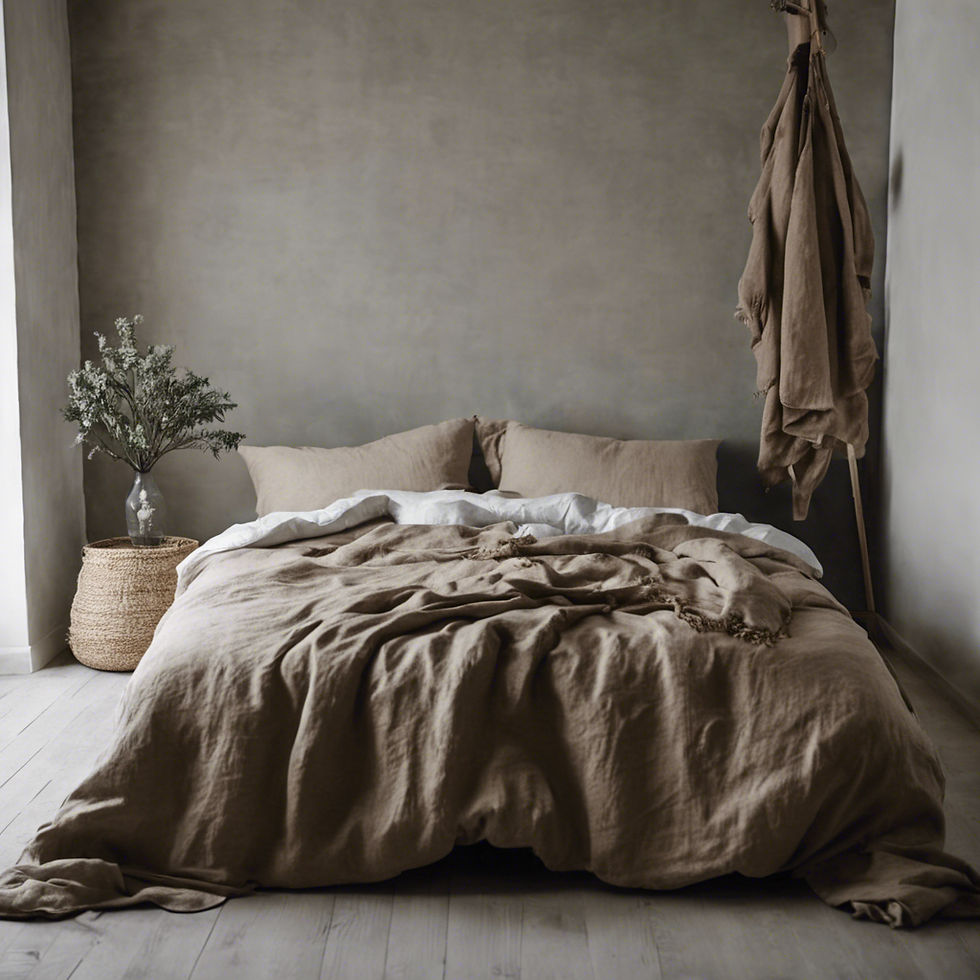The Hidden Connection Between Fabric Choice and Sleep Quality: Why Your Bedding Matters More Than You Think
- Nataša Kelšin

- Sep 9, 2024
- 3 min read
When we think of sleep, most of us focus on the hours we get or the mattress we choose. But have you ever considered how the fabric of your bedding impacts your rest and well-being? In recent years, attention has shifted toward the unseen consequences of certain fabric choices, particularly synthetic and even some "organic" options, and how they may be affecting our health, environment, and sleep quality.
The Microplastic Problem: What You Can’t See Could Be Hurting You
One of the most overlooked issues with common bedding materials like polyester is the release of microplastics. Polyester, often marketed as a soft, durable, and affordable option, is a form of plastic. When you sleep on polyester bedding, your body heats up the fabric, causing it to shed microscopic fibers. These microplastics can be inhaled throughout the night and have been linked to respiratory issues and other health concerns.

The problem doesn't stop at night. Each time polyester bedding is washed, tiny plastic fibers are released into the water system, contributing to the ever-growing microplastic pollution problem in our oceans. According to studies, billions of microplastic particles are flushed into our water systems daily, eventually making their way into the food chain and our bodies.
Even some "organic" or "eco-friendly" bedding sets can contain synthetic blends, posing similar risks. What might seem like a sustainable choice on the surface could still expose you to the microplastic problem if the fabric is mixed with synthetic fibers.
How Fabric Choice Impacts Sleep Quality
The fabrics we sleep on can drastically influence the quality of our sleep. Synthetic materials like polyester trap heat and moisture, often leading to overheating and restless nights. Natural fabrics, on the other hand, promote better airflow and temperature regulation (bamboo and viscosa are not natural fabrics for example).
Flax linen, for instance, is highly breathable and moisture-wicking, allowing your body to maintain an optimal temperature throughout the night. Flax linen also softens over time, providing increased comfort with each wash. Unlike synthetic fibers, linen does not release harmful microplastics, making it both a healthier option for you and a more sustainable choice for the environment.

Why Flax Linen is the Superior Choice
Flax linen has long been praised for its unique qualities, making it an ideal fabric for bedding. Here are a few key reasons why flax linen is worth the investment:
Breathability: Linen is one of the most breathable fabrics, promoting airflow and keeping you cool throughout the night.
Hypoallergenic: Flax linen is naturally hypoallergenic, reducing the risk of allergies and respiratory issues.
Sustainability: Linen is made from the flax plant, which requires far fewer resources to grow than cotton and doesn’t involve harmful chemicals or pesticides. And because it's biodegradable, it won't contribute to the growing waste problem.
Durability: Linen becomes softer with each wash and lasts for years, making it a long-term investment in both comfort and sustainability.
No Microplastics: When you choose 100% flax linen, you eliminate the risk of inhaling microplastics or contributing to water pollution through your laundry.

FEK’s Commitment to Sustainable Bedding
As the owner and creator of FEK's bedding brand, I, Nataša Kelšin, am personally dedicated to promoting the many benefits of flax linen. I am continuously investing in research to better understand the relationship between fabric choice, health, and environmental sustainability. With a clear understanding of how synthetic materials like polyester impact both our sleep and our planet, I have built my brand around offering a superior, eco-friendly alternative.
Flax linen isn’t just a fabric; it’s a step toward a healthier lifestyle and a more sustainable future. By choosing flax linen bedding, you’re not only making a choice that benefits your sleep and well-being but also contributing to a cleaner, greener Earth.
Moreover, flax linen has the potential to be a profitable investment. Its durability and timeless appeal mean that you won’t need to frequently replace your bedding. Over time, this reduces waste and proves to be a cost-effective solution. The rise in demand for eco-conscious products has also shown that flax linen can be both a luxury and a responsible choice, leading to extra profit for businesses committed to sustainability.
The Time to Switch is Now
As we learn more about the health and environmental consequences of synthetic fabrics, it’s clear that natural materials like flax linen are the superior choice. Not only do they provide a more restful and comfortable night’s sleep, but they also offer peace of mind by reducing your exposure to harmful microplastics.
If you’re looking to upgrade your sleep experience and make a sustainable choice for the planet, consider switching to custom-made flax linen bedding from FEK’s. Your body—and the environment—will thank you.
Nataša Kelšin
CEO and creator of FEK's bedding




Comments